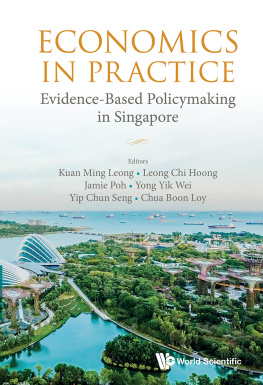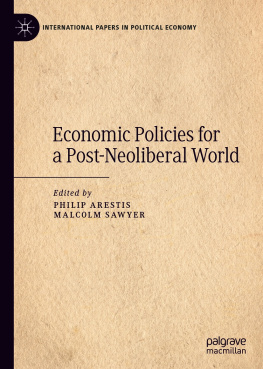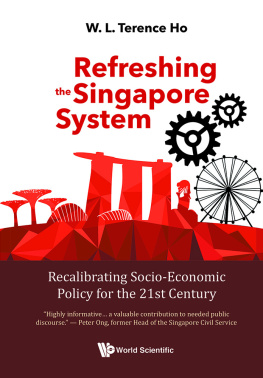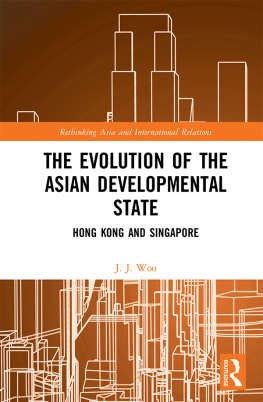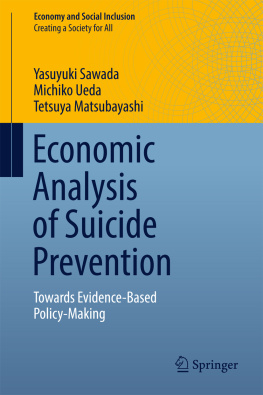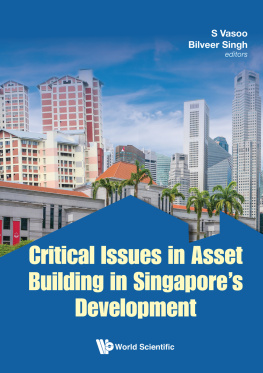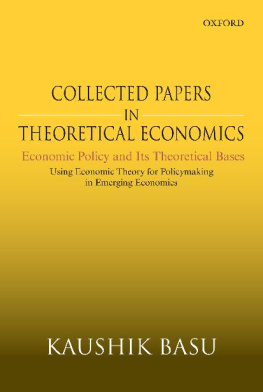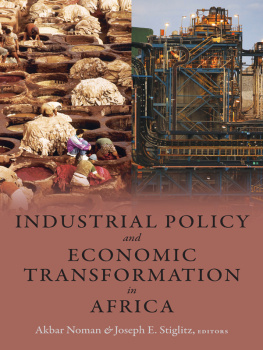
ECONOMICS
IN PRACTICE
Evidence-Based Policymaking
in Singapore
ECONOMICS
IN PRACTICE
Evidence-Based Policymaking
in Singapore

Editors
Kuan Ming Leong
Ministry of Trade and Industry, Singapore
Leong Chi Hoong
Ministry of Sustainability and the Environment, Singapore
Jamie Poh
Ministry of Finance, Singapore
Yong Yik Wei
Ministry of Trade and Industry, Singapore
Yip Chun Seng
Ministry of Finance, Singapore
Chua Boon Loy
Central Provident Fund Board, Singapore

Published by
World Scientific Publishing Co. Pte. Ltd.
5 Toh Tuck Link, Singapore 596224
USA office: 27 Warren Street, Suite 401-402, Hackensack, NJ 07601
UK office: 57 Shelton Street, Covent Garden, London WC2H 9HE
National Library Board, Singapore Cataloguing in Publication Data
Name(s): Kuan, Ming Leong, editor. | Leong, Chi Hoong, editor. | Poh, Jamie, editor. | Yong, Yik Wei, editor. | Yip, Chun Seng, editor. | Chua, Boon Loy, editor.
Title: Economics in practice : evidence-based policymaking in Singapore / editors, Kuan Ming Leong, Leong Chi Hoong, Jamie Poh, Yong Yik Wei, Yip Chun Seng, Chua Boon Loy.
Description: Singapore : World Scientific Publishing Co. Pte. Ltd., [2021]
Identifier(s): ISBN 978-981-12-5001-9 (hardcover) | 978-981-12-5011-8 (paperback) | 978-981-12-5002-6 (ebook for institutions) | | 978-981-12-5003-3 (ebook for individuals)
Subject(s): LCSH: Central planning--Singapore. | Singapore--Economic policy. | Singapore--Social policy. | Infrastructure (Economics)--Singapore.
Classification: DDC 338.95957--dc23
British Library Cataloguing-in-Publication Data
A catalogue record for this book is available from the British Library.
Credit for back cover and section divider photographs: Singapore Tourism Board
Copyright 2022 by the Ministry of Trade and Industry, Singapore
All rights reserved.
For any available supplementary material, please visit
https://www.worldscientific.com/worldscibooks/10.1142/12662#t=suppl
Desk Editors: Jiang Yulin/Lai Ann
Typeset by Stallion Press
Email:
Printed in Singapore
Contents
Kuan Ming Leong, Leong Chi Hoong, Jamie Poh and Yong Yik Wei
Kuan Ming Leong
Andy Feng, Gerald Foong and Geraldine Lim
Kuan Ming Leong
Tan Di Song
Andy Feng
Fan Shir Li, Marsha Teo and Wen Jia Ying
Tan Yen Ling, Glenvicia Sim, Ng Woon Chian and Ong Xiao Lin
Goh Tee Wei, Nicholas Chiang, Afiqah Suhaiemi and Foo Suan Wee
Samuel Huang, Juliana Ng and Kevin Low
Chia Yee Fei
Leong Chi Hoong
Eileen Lee, Vera Lim and Jason Teo
Leong Wai Yan, Tiffany Foo and Ng Woon Chian
Kuan Ming Leong, Leong Chi Hoong, Jamie Poh and Yong Yik Wei
Foreword
Mr Gan Kim Yong
Minister for Trade and Industry
Singapores transformation from Third World to First is one of the most successful stories in development economics in the 20th century. Within a generation, Singapore has built up a highly competitive and globalised economy, and significantly enhanced the well-being of its people.
Much has been written about Singapores success factors, including a stable and competent Government, an international outlook, sustained investments in human capital, strong macroeconomic fundamentals and robust institutions.
What may not be so widely appreciated is the importance of quality policymaking, guided by sound economic principles and analysis. Recognising the critical role of rigorous economic analysis in public policies, the Singapore Government established the Economist Service in 2001 to deepen professional economic expertise in the public sector. By developing a core group of professional economists, the objective of the Economist Service is to sharpen the quality of policy analysis and formulation in order to bring about better outcomes in public policies.
This year marks the 20th year of the formation of the Economist Service. Over the past two decades, Singapore has continued to enjoy healthy economic progress. Despite the impact of external shocks such as the Global Financial Crisis and the COVID-19 pandemic, the size of Singapores real economy more than doubled between 2001 and 2020. In tandem with economic growth, real median income in Singapore increased by 65% during this period, bucking the trend in many advanced economies which faced median wage stagnation. Alongside the nations progress, the Economist Service has likewise achieved many milestones over the past 20 years.
First, the Economist Service has grown in size, from five economists when it was formed to close to 100 economists today.
Second, the Economist Service has expanded and deepened its capabilities. Apart from enhancing its expertise in macroeconomic analysis, it has built up strong capabilities in the microeconomic analysis of sectors, firms and individuals. These straddle a wide range of Economics disciplines, from international trade and industrial organisation, to labour and public economics, as well as health and environmental economics. In recent years, the Economist Service has also developed expertise in data science-related disciplines.
Third, the Economist Services span of capabilities has enabled it to contribute robust economic research and analysis in multiple policy domains, ranging from economic and socioeconomic policies to security and infrastructural ones, across more than 20 Government agencies.
Fourth, the Economist Service has developed a strong core of talent through initiatives to attract graduates from reputable universities, the award of scholarships, as well as structured postings and training programmes.
Today, the Economist Service plays an integral role in the policy formulation process in Singapore, from the upstream design of public policies to the downstream evaluation of government initiatives and schemes. It also continues to champion evidence-based policymaking and a data-driven mindset within the public sector. Through its research and analytical studies, the Economist Service has deepened policymakers understanding of complex policy issues and enhanced the quality of policy formulation in the public sector.
To commemorate the Economist Services 20th anniversary, this book showcases the importance of economic analysis in the formulation of Singapores public policies and provides an illustration of the diverse areas that our economists contribute to. This book is also a tribute to the rich analytical studies that have been undertaken by economists in the Economist Service over the years.
Against the backdrop of an increasingly volatile global economy and more challenging trade-offs in our domestic economy, evidence-based policymaking will remain an integral part of our efforts to chart Singapores future. I am confident that the Economist Service will continue to contribute to Singapores economic and social development in the years ahead.
Acknowledgements
The idea of writing a book to commemorate the Economist Services (ES) 20th anniversary in 2021 was first suggested in December 2020. The rapid turnaround of this book within a year is testament to the hard work that was put in by multiple stakeholders across many organisations.
This book is a reflection of the ESs multi-agency network and would not have been possible without the contributions of over 30 economists who are based in 12 Ministries and agencies. In alphabetical order, these organisations include the Central Provident Fund Board (CPFB), Land Transport Authority (LTA), Ministry of Culture, Community and Youth (MCCY), Ministry of Finance (MOF), Ministry of Health (MOH), Ministry of Home Affairs (MHA), Ministry of Manpower (MOM), Ministry of National Development (MND), Ministry of Social and Family Development (MSF), Ministry of Sustainability and the Environment (MSE), Ministry of Trade and Industry (MTI) and Urban Redevelopment Authority (URA). We thank the relevant officers and management of these organisations for their invaluable inputs to the chapters in this book. We also express our appreciation to economists from the broader ES community, who enriched the chapters by contributing their knowledge of past studies and useful references. In addition, we extend our gratitude to Choy Choon Ho for providing statistical assistance.
Next page
